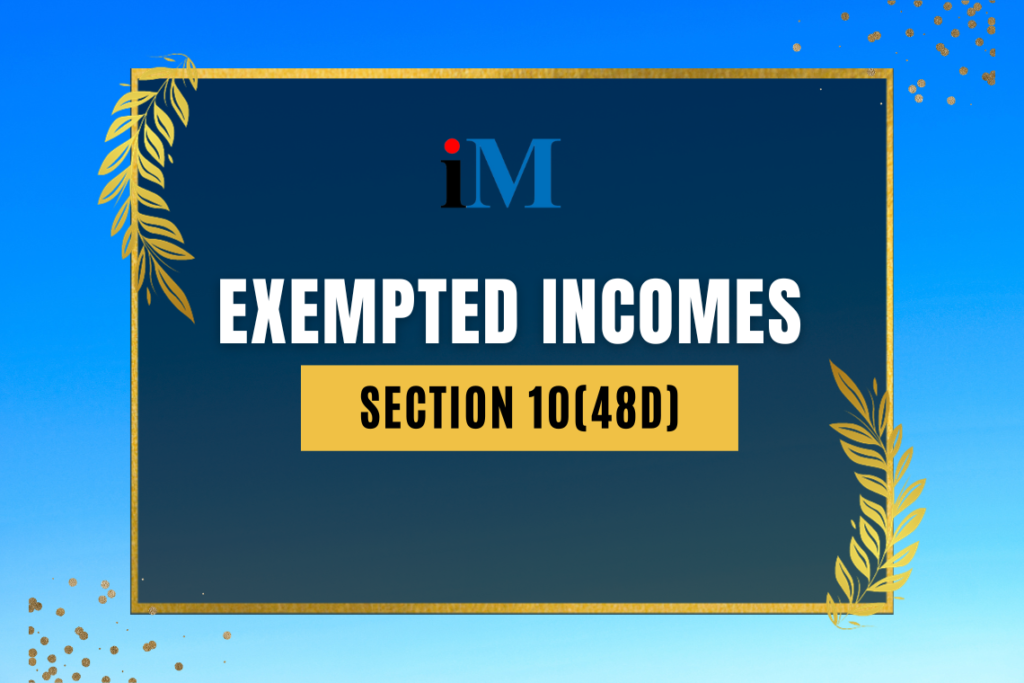Developmental financing institutions play a crucial role in promoting economic growth and development in a country. These institutions provide long-term funding for various developmental projects and sectors such as infrastructure, agriculture, and small and medium enterprises. To encourage the growth of these institutions, the Income Tax Act of India provides certain exemptions and benefits.
One such exemption is provided under Section 10(48E) of the Income Tax Act, which states that the income of a developmental financing institution shall be exempt from tax. This exemption is applicable to institutions that are notified by the Central Government and fulfill certain conditions.
To qualify for the exemption under Section 10(48E), a developmental financing institution must meet the following criteria:
- The institution must be notified by the Central Government as a developmental financing institution.
- The institution must be engaged in the business of providing long-term funding for developmental projects.
- The institution must fulfill any other conditions as specified by the Central Government.
Once a developmental financing institution fulfills these criteria and is notified by the Central Government, its income becomes exempt from tax. This means that the institution does not have to pay income tax on its earnings.
The exemption under Section 10(48E) is a significant benefit for developmental financing institutions as it allows them to retain more funds for financing developmental projects. It helps in reducing the cost of borrowing for these institutions, which in turn benefits the borrowers who can avail of funding at lower interest rates.
Additionally, the exemption encourages the growth and expansion of developmental financing institutions in the country. It attracts more investors and lenders to these institutions, as they can enjoy tax benefits on their investments. This leads to an increase in the availability of funds for developmental projects, which ultimately contributes to the overall economic development of the country.
It is important to note that the exemption under Section 10(48E) applies only to the income of the developmental financing institution. Other taxes such as goods and services tax (GST) and regulatory fees may still be applicable to these institutions.
Incomes eligible for Exemptions:
Section 10(48E) of the Income Tax Act, 1961 provides for exemption from income tax to any developmental financing institution (DFI) in respect of the following income:
- Income from loans and advances made to eligible borrowers;
- Income from investments in equity and debt of eligible borrowers;
- Income from interest on bonds issued by the DFI;
- Income from fees and commissions charged for providing financial services to eligible borrowers.
- Income from the lending of money to any person for carrying on any business or activity in India;
- Income by way of interest on loans and advances made to borrowers for the purposes of infrastructure development;
- Income by way of dividends on shares and securities held in companies engaged in infrastructure development;
- Income by way of capital gains on the sale of shares and securities held in companies engaged in infrastructure development.
Conditions for Exemptions:
To be eligible for this exemption, the DFI must satisfy the following conditions:
- It must be registered under the Companies Act, 2013.
- It must be notified by the Central Government for the purposes of this exemption.
- It must be primarily engaged in providing financial assistance to eligible borrowers for the development of infrastructure and other productive sectors of the economy.
Examples:
- The National Bank for Agriculture and Rural Development (NABARD) is a DFI that was established under the National Bank for Agriculture and Rural Development Act, 1981. NABARD is primarily engaged in providing financial assistance to eligible borrowers for the development of agriculture, rural development, and other productive sectors of the economy.
- The Central Government has notified NABARD for the purposes of exemption under Section 10(48E). This means that NABARD is exempt from income tax on all of its income, including income from interest, dividends, capital gains, and other sources.
- A DFI lends money to a company that is building a new highway project in India. The income that the DFI earns from interest on this loan is exempt from income tax under Section 10(48E).
- Suppose the DFI earns Rs. 100 crores from interest on this loan in a financial year. The DFI will not have to pay any income tax on this income, due to the exemption provided under Section 10(48E).
Benefits of the exemption
The exemption provided to DFIs under Section 10(48E) has the following benefits:
- It reduces the cost of financing long-term development projects in India.
- It encourages DFIs to invest in new and innovative development projects.
- It helps to improve India’s infrastructure and development, which has a positive impact on the economy and the lives of Indians.
- It reduces the cost of financing infrastructure and other productive sectors of the economy, which makes it more viable for investors to invest in these sectors.
- It encourages the development of new and innovative infrastructure and other productive projects.
- It helps to improve India’s economic growth and development.
Examples of DFIs
Some examples of DFIs that are eligible for exemption under Section 10(48E) include:
- Infrastructure Finance Company Limited (IFCL)
- Small Industries Development Bank of India (SIDBI)
- National Bank for Agriculture and Rural Development (NABARD)
- Export-Import Bank of India (EXIM Bank)
- National Housing Bank (NHB)
How to claim the exemption
If you are a DFI that is eligible for exemption under Section 10(48E), you need to file an income tax return and claim the exemption in the return. You will also need to submit the necessary documentation to support your claim.
Conclusion:
In conclusion, the exemption provided under Section 10(48E) of the Income Tax Act is a significant benefit for developmental financing institutions. It helps in promoting economic growth and development by encouraging the availability of long-term funding for developmental projects. The exemption attracts more investors and lenders to these institutions and reduces the cost of borrowing. Overall, it plays a crucial role in fostering the growth of developmental financing institutions and contributing to the overall economic development of the country.

![Income of a Developmental Financing Institution (DFI) to be Exempt [Section 10(48E)]](https://incometaxmanagement.in/wp-content/uploads/2023/10/57-Exempted-Incomes-Section-1048E-1024x683.png)

![Residential Status [Sections 5 to 9B]](https://incometaxmanagement.in/wp-content/uploads/2023/09/Residential-Status-Sections-5-to-9B-1024x683.jpg)

![EXEMPTED INCOMES [Section – 10, 10AA, 11 to 13A]](https://incometaxmanagement.in/wp-content/uploads/2023/09/Exempted-Incomes-Section-10-1024x683.jpg)

![Income of an Electoral Trust shall be Exempt [Section 13B]](https://incometaxmanagement.in/wp-content/uploads/2023/10/61-Exempted-Incomes-Section-13B-1024x683.png)
![Incomes of Political Parties [Section-13A]](https://incometaxmanagement.in/wp-content/uploads/2023/10/60-Exempted-Incomes-Section-13A-1024x683.png)
![Special Provisions in respect of Newly-established Units in Special Economic Zones (SEZ) [Section-10AA]](https://incometaxmanagement.in/wp-content/uploads/2023/10/59-Exempted-Incomes-Section-10AA-1024x683.png)
![Exemption in respect of income chargeable to Equalization Levy [Section 10(50)]](https://incometaxmanagement.in/wp-content/uploads/2023/10/58-Exempted-Incomes-Section-1050-1024x683.png)

